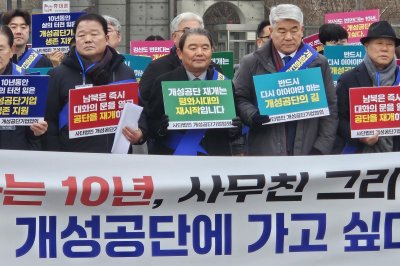S. Korean firms urge gov’t to facilitate visits to inter-Korean industrial complex

Members of the Corporate Association of Gaeseong Industrial Complex held a press conference Friday at the customers, immigration and quota (CIQ) office in Paju on Friday, calling for the government to help business owners access the shuttered complex. Photo by Yonhap
An association of South Korean companies that previously operated at an inter-Korean factory zone in North Korea on Tuesday called on the government to make efforts to allow business owners to visit the now-shuttered complex.
About 80 representatives from 38 member companies of the Corporate Association of Gaeseong Industrial Complex (CAGIC) made the request at a press conference held at the customers, immigration and quota (CIQ) office at Dorasan Station in Paju, just north of Seoul.
The association said its members hope to present the Kaesong Industrial Complex, which has been closed for the past decade, to inspect their business assets there.
“Ten years after the closure of the Kaesong Industrial Complex, companies that operated there are facing a threat to their survival. We want to return to Kaesong,” CAGIC Chairman Cho Kyung-joo told reporters.
The Park Geun-hye administration shut down the industrial complex on Feb. 10, 2016, in response to North Korea’s nuclear test and long-range missile launches.
Launched in 2004 as a flagship project symbolizing inter-Korean economic cooperation and reconciliation, the complex once employed about 55,000 North Korean workers at 120 South Korean firms.
Cho also urged the U.S. government to play a responsible role in approving visits by South Korean business owners aimed at protecting their assets in Kaesong.
“Just as the United States recently granted sanctions exceptions for humanitarian assistance in several global cases discussed at United Nations meetings, it should make clear that business owners’ visits to inspect their assets in Kaesong do not fall under sanctions”, he said.
Appealing to North Korea, Cho said companies operating at the complex had conducted business in good faith based on inter-Korean agreements and called on Pyongyang to cooperate in allowing business owners to visit the industrial zone.
Copyright (c) Yonhap News Agency prohibits its content from being redistributed or reprinted without consent, and forbids the content from being learned and used by artificial intelligence systems.
